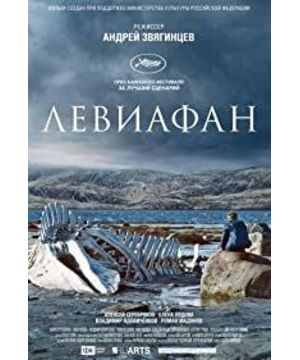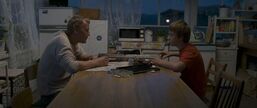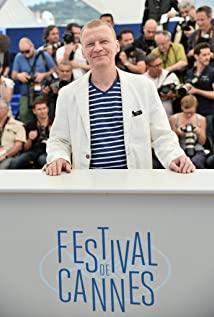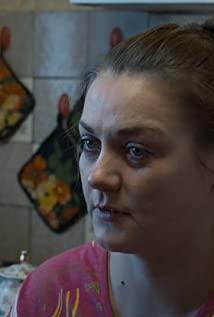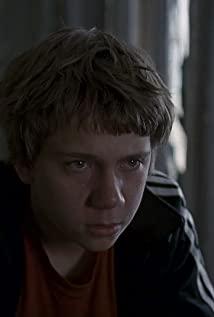LL looked at the text and said that the director had filmed "Tilbake" before ("come back" in Norwegian). At that time, I didn’t rest assured, and prepared to go out immediately as usual-because we had agreed to drive to the Vietnamese supermarket to buy some oriental food home.
The two of them filed out and were about to enter the garage. Standing at the door, they suddenly realized what "Tilbake" was. It was "Return" that I liked!
It just changed a language and didn't recognize it. LL said, let's go back and book tickets now? So the two went back home again, really going to book tickets first and then go out for business.
This is the work of Andrey Zvyagintsev (Andrey Zvyagintsev) after nearly ten years.
The first time was "Return."
This is also his first work, and I still remember the shock at that time.
Shocked the bitterness and sadness that penetrated from the bones in that movie. The complexity, the light twinkling in the dark blue tone made me want to experience this nation more and more deeply-remember that it also shocked me at the same time Meter. Meter. The book "The Master and Margarita" by Father Bulgaco.
Or it was this shock that increased my willingness to go to this country in the future, and indeed I did go soon after.
I still remember that the movie has no feminine self-pity, it is male, or a certain language that should be in the patriarchal world.
But at that time, I felt that this masculine temperament was filled with a certain kind of inescapable doubt, weakness and helplessness hidden in the deepest point-this was felt more deeply in this "Leviathan".
His films are full of various symbols, either this is his original intention, or we are just too sensitive and have too much interpretation.
Just as the first "Return" was a great success that year, he refused to answer many media asking him to answer his film by himself-at that time he thought his views would affect the judgment of the viewers.
However, he would write a special essay on his own to point out that "the story sees the situation of life in an allegory way. As long as the audience follows this direction, they will surely see the true meaning.".
This is a very peculiar contradiction, this contradiction runs through his earliest first film, which lasted until 2014.
-------------------------------------------------- ------------------------------
The female character (child mother) in his first movie is like a The character who must appear, no matter what happens, she seems to be always there, but she is so far away.
In "Leviathan", the female is present as the protagonist, but the ending for her is to let her die and disappear forever.
This movie still continues the implied allegorical style of the previous "Return", but lacks the painful and painful poetry of the past. Regardless of the camera and the rhythm, there is something more plain-he seems to be starting his story in a simpler way than before.
But the male core is consistent, so the death of Lilya (female lead) is inevitable.
There is too much to say about her. . . But it must be as streamlined as possible.
LL couldn't understand her suicide, and he felt abrupt and incomprehensible. He thinks that Kolya (male protagonist) has decided to forgive her for her cheating. Things should go better. Why is she doing this?
I said it was because when she plucked up the courage to appease the boy Roma who was consciously hurt, the child’s utter malice and hatred against her completely knocked her down—naturally, in LL’s perception, the child They all seem to be harmless, how can there be such a huge lethality?
Indeed, her death probably cannot be said to be decided only by the child's words. It was too many attempts to cater to, to please, to disappoint again and again, and to despair after being injured.
In the end, she completely collapsed because of these words-this was the last straw that overwhelmed her.
LL’s question is also equivalent to saying how can a straw overwhelm a camel? ——But the fact is that under the power of the last straw, the camel crashed down.
In the real world, how can the harm done by children to adults be underestimated? Why can Roma in the movie consistently treat her stepmother maliciously? Isn't it because the father has never really substantively restrained and controlled it? What's more, his own father didn't show that kind of real respect and care for this woman in front of the child.
As a stepmother, Lilya is embarrassed in this home, because before she came, this home had already formed a certain inherent pattern of her own. Would it be easy for her to intervene in the middle to be fully integrated? What's more, her daily experience at home is also humiliating in a certain sense, because her husband doesn't seem to make any effort with hostile children to show her existence. And her hard work, the child never appreciates, from the beginning of the movie, the child has not even said "Good morning" to her.
When her remaining hope that the Moscow lawyer could take her away was finally shattered, she had nowhere to go back home, with scars on her face that had just been beaten.
She poured out the overflowing vodka and drank it, and said,
"Do you want a child?" (meaning their own child)
This kind of bitterness and humiliation can only be understood by being in it. . . . . . At that time, deep down in my heart, I would feel unbearable and even more desperate and hated.
From her point of view, wouldn’t she be a husband who would drive away her lover once exposed for a short period of time. The stepson who has been deliberately ignoring her existence and maliciously facing each other every day is not just a “Leviathan” that came out of the union. NS?
The last look she left in the picture before her death was a mixture of despair, anger and hatred that was a mixture of great humiliation, wronged but nowhere to go.
The world is hopeless before her.
So in front of her eyes, in the deep sea, the figure of the black water beast Leviathan was tumbling out.
-------------------------------------------------- ------------------------------
Yes, "Leviathan" is everywhere.
In Lilya's case, the metaphor "Leviathan" that killed her could be the three men in front of her in the patriarchal world.
And in the place of these same three big and small men, the relative "Leviathan" needless to say is the ruthless mayor of the powerful land acquisition in the movie.
At the beginning of this, the drunk and unsteady mayor said to them the first sentence:
"You insects (or ants)." The
tone and gesture are ambiguous because of drunkenness, but the meaning is There is no doubt about it.
Even after a brief guilty conscience and confession, he easily scared away Moscow lawyer Dmitriy, let Kolya sit for 15 years, and let Roma become an adopted child.
Will he be able to represent "Leviathan" plentifully? ——No, it's not enough.
There is even greater power behind him, and in front of that power, he is just a "worm" that he disdains to comment on others.
Because he took the land of Kolya's home by force, not for his own personal use, but to use it to build a brand-new church—a place where everyone bowed their heads and praised the divine power.
The most interesting thing is that at the end of the film, the preaching by the bishop in the newly built church on the land where Kolya lived on the plains.
LL found the "Leviathan" video on Youtube, but only in English subtitles.
The words of the bishop are very long, just take a paragraph:
"God dwells not in strength, but in truth.........Truth is God's legacy. Truth reflects the world as it really as it really is, without distortion. But only the who koows God's truth can find truth. And God's truth is Christ Himslf."
("God does not live in power, but in truth... Truth is the wealth God has left us. Truth reflects the true state of the world without any distortion. But only those who know the truth of God can find the truth. And the truth of God is Christ Himself.") The
translation is non-professional, the general meaning.
When the bishop was preaching solemnly, the mayor leaned over and said to his son:
"God sees everything, son."
Doesn't that son look like Putin's childhood version?
The child's eyes were firm, and he swept away the coldness and determination that blocked everything in front of him.
In the higher class of the patriarchal world, children with the appearance of childhood Putin looked up at the top of the newly built church.
It was the same angle that Kolya saw from the ceiling of the dilapidated and abandoned church as he drank vodka in anguish when he knew that his wife was dead.
There are many similar satires in the movie, such as when everyone went to the field to shoot the former Soviet Union and the heads of some Russian leaders after the disintegration. This irony of past and present national leaders seems to have a certain rebellious connotation.
But the most ironic thing is also here, because the film’s opening credits specifically stated that it was produced by "jointly supported by the Russian Ministry of Culture and the National Film Foundation."
Such a huge ironic reflection in the whole movie is really infinitely desolate. . . . . .
-------------------------------------------------- ------------------------------------ In
this movie, Kolya is the "father" in the patriarchal world The role is weak and failed.
In contrast to him, the mayor as a "father" in this world is undoubtedly successful.
Kolya is no longer the silent father in "Return", with rigidity as if a little harsh but eventually dying.
He was an incompetent man who was addicted to alcohol and couldn't defend everything he had-no matter his son, wife, or house, he finally cried and didn't know how to face his own destiny.
After he knew that his wife had died, he sat alone on the cliff by the sea, facing the deep sea with tears and asked the first time:
"Why?"
"God, why?" The second time.
When he was most helpless, he began to want to find God.
And the answer the priest gave him was to quote what Jehovah said to Job in Chapter 41 of the Book of Job in the Bible.
"Can you catch a crocodile with a hook (official translation of the Bible, which means "Leviathan")? Can you use a rope to hold down its tongue? Can you use a rope to pierce its nose? You can use a hook to pierce it Is it its cheekbone? Does it plead with you and speak soft words? Will it make a covenant with you so that you can use it as a slave forever? "
Yes, no.
The priest said: "There is nothing in the world that can compete with it. It destroys all pride." The
Lord said this passage to ask Job to truly obey him.
The priest also said that only by believing in God and willing to truly obey can he be saved.
But in this movie, the "God" shown by Andrei Sarkinseff is obviously not just the Jehovah in the Bible, but something more complicated.
I remember that Taiwan’s translation of this movie is "The Entangling Snake", which is an excellent translation. This movie is so entangled with countless clues, circling back and forth, it is difficult to cut short words.
-------------------------------------------------- -----------------------------
In "Return", the boy's heart surging out is the father-killing complex, and in "Return" In Leviathan, the almost-aged boy has been in love with his father, but the hatred for Lilya, can't it be understood as a mother-killing (stepmother) complex?
Yes, the children in "Return" are missing and dying from their biological fathers.
What is missing in "Leviathan" is the biological mother and the stepmother who died.
If you want to go into the metaphor of Andrey Sarkinseff, there is too much to say in this movie. . . . Stop.
How can we truly define "Leviathan"?
Obviously Andrei Sarkinseff can't give a really clear answer.
Because he perceives that the things he wants to express are also intricate, so the viewer is also in his lens.
But there is no doubt that it is "Leviathan", the size of "Leviathan" in various situations is everywhere.
As long as human society exists, it will never disappear.
Postscript: In 2012, British director Lucien Castaing-Taylor also made a movie of the same name, "Leviathan".
It was the so-called "experimental documentary."
Looking at the preview of 4 minutes and 6 seconds, I actually felt unable to stick to the whole process. Those seemingly random pictures still feel the insignificance and helplessness of life. Seeing the flying seagulls in those strange images through the churning water surface, I feel the power and ruthlessness of the laws of nature.
What appears in the screen shots is also the words from Chapter 41 of the Book of Job in the Bible.
31. It makes the abyss boil like a pot, and the ocean like oil in a pot.
32. The path it traveled then glowed, making one think that the abyss was like white hair.
33. There is no fearlessness on earth like it was made.
-Chapter 41 of the Book of Job. 31-33
View more about Leviathan reviews


